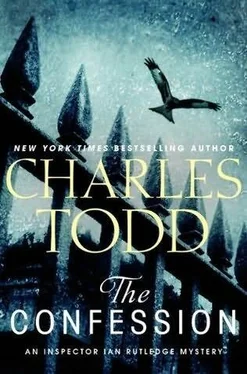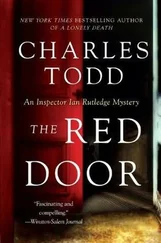Charles Todd - The Confession
Здесь есть возможность читать онлайн «Charles Todd - The Confession» весь текст электронной книги совершенно бесплатно (целиком полную версию без сокращений). В некоторых случаях можно слушать аудио, скачать через торрент в формате fb2 и присутствует краткое содержание. Жанр: Полицейский детектив, на английском языке. Описание произведения, (предисловие) а так же отзывы посетителей доступны на портале библиотеки ЛибКат.
- Название:The Confession
- Автор:
- Жанр:
- Год:неизвестен
- ISBN:нет данных
- Рейтинг книги:5 / 5. Голосов: 1
-
Избранное:Добавить в избранное
- Отзывы:
-
Ваша оценка:
- 100
- 1
- 2
- 3
- 4
- 5
The Confession: краткое содержание, описание и аннотация
Предлагаем к чтению аннотацию, описание, краткое содержание или предисловие (зависит от того, что написал сам автор книги «The Confession»). Если вы не нашли необходимую информацию о книге — напишите в комментариях, мы постараемся отыскать её.
The Confession — читать онлайн бесплатно полную книгу (весь текст) целиком
Ниже представлен текст книги, разбитый по страницам. Система сохранения места последней прочитанной страницы, позволяет с удобством читать онлайн бесплатно книгу «The Confession», без необходимости каждый раз заново искать на чём Вы остановились. Поставьте закладку, и сможете в любой момент перейти на страницу, на которой закончили чтение.
Интервал:
Закладка:
“Someone shot him in the back of the head. Before putting him in the river.”
There was consternation in the room. The other men, listening, stirred restlessly.
The barkeep shook his head. “Well. They’ll meet on the other side, won’t they?” he said after a moment.
“What’s Willet to you, that you would have stopped me any way you could?”
“My wife Abigail is his only daughter. Who’d want to kill Ben? We never heard of him making enemies. He could put on airs with the best of them, but no one minded.”
“Fishing is a hard way to make a living. Furnham didn’t hold it against Ben Willet that he’d escaped to a different life? Possibly a better one?”
“Ned wasn’t happy.” Barber frowned. “If anyone else felt strongly, I never heard of it.”
The older man who had been sitting alone, eating, spoke from the far end of the room. “When he came back on his last leave before sailing to France, showing off his uniform, everyone was glad to see him. I remember. My daughter fancied him. But nothing came of it.”
“You said he could put on airs. What did you mean by that?”
“He’d hobnobbed with his betters, hadn’t he? He could pass himself off as a duke, he said, if he’d half a mind to do it. He had Abigail in tears one night, she laughed so hard, describing the family he worked for, taking all the parts. It was better than a stage play.” As if realizing he was speaking of the dead, Barber added, “Aye, that was Ben.”
Rutledge recalled the man who had come to his office, passing himself off as another person, a gentleman. He had done it so well that he’d even fooled an inspector at Scotland Yard. But then he, Rutledge, had had no reason to doubt him. It was unlikely that such a man would come forward to confess to a murder he hadn’t committed.
Or had he?
Pulling out the photograph again, Rutledge said, “And you are absolutely certain that this man is Ben Willet?”
“Ask them,” the barkeep said, gesturing to the other men in the bar.
And so he did, showing the photograph to each of the three men in turn. He met hard eyes staring up at him, but in them Rutledge read recognition and certainty.
Walking back to the center of the room, Rutledge said, “And what about Wyatt Russell? How many of you know him?”
There was a silence. One of the players finally answered, “Not to say know him. He lived at River’s Edge before the war.”
“How well did Ben Willet know him?”
“I doubt they ever spoke to each other more than a time or two,” Barber said. “The Russells wanted no part of us here in Furnham. The family never has.” He appeared to be on the point of adding more, then thought better of it.
“I was told the men of Furnham helped the family search for Mrs. Russell when she went missing.”
“That was the police set us to scouring the marsh,” one of the older men answered. “It wasn’t the Russells.”
“Justin Fowler, then.”
One of the older men stirred in his chair, but when Rutledge turned his way, he said only, “I’ve heard the name. I doubt I could put a face to it.”
“He never had much to do with Furnham either,” Barber told Rutledge. “From River’s Edge it was easier to go west than turn east. There was nothing here the family needed or wanted.”
“Someone sold them fish from time to time,” Rutledge said, remembering what Nancy Brothers had told him.
“Ned would take part of his catch to the cook. Mrs. Broadley. And she was the one who paid for it. I doubt he saw Mrs. Russell five times over the years.”
“She did come once to thank him,” the lone diner put in. “I’ll say that for her.”
“Do any of you know what became of Wyatt Russell or Justin Fowler?”
After a moment Barber said, “They went off to fight in the war, didn’t they? No one opened the house again afterward. Which says they didn’t come home.”
But Rutledge wasn’t sure he was telling the truth. When he turned to look at the other men in the pub, they refused to meet his eyes, staring out at the river at their backs.
He said, “I’d like to speak to Mrs. Barber. She should know more about her brother’s years here in Furnham, before he went into service. Where will I find her?”
“Here! You aren’t showing that dead man’s face to my wife, and him her own brother!” Barber was on his feet. “And how is she to keep the news from her father? I ask you!”
“I’ll strike a bargain with you. Find a way for me to speak to Mrs. Barber and I will keep her brother’s death out of it. For now.”
The barkeep considered him. “I have your word?”
“You do.”
Barber turned on his patrons. “I’m leaving. If one word of what happened just now goes beyond this room, you’ll have me to answer to. Am I understood?”
There were hasty nods of agreement, and then Barber said to Rutledge, “Come with me.”
From The Rowing Boat they went left, and Rutledge soon found himself in a muddy lane that led north from the High Street past a row of elderly cottages. The one at the far end was barely larger than its neighbors, and here Barber turned up the walk.
“You’ll remember your word,” Barber demanded before reaching out to lift the latch and swing the door wide. Rutledge nodded.
The front room was surprisingly comfortable. The furnishings were old but well polished and upholstered in a faded dark red. A thin carpet with arabesques in deep shades of blue, red, and cream covered the floor. It seemed out of place here, somehow, but gave the room an air of worn elegance, and Rutledge wondered if it had come from River’s Edge. Sunlight spilled across it to touch the iron foot of a plant stand where the fronds of a luxuriant fern overhung a dark blue fired clay pot. To Rutledge’s eyes, it appeared to be French.
Barber left Rutledge standing there and went to fetch his wife.
After several minutes he returned accompanied by a small, plump woman with a pretty face, although she was pale and there were dark pockets beneath her green eyes, as if she hadn’t slept well in a very long time.
“Mr. Rutledge, I’ve told Abigail that you’re trying to find anyone connected with the family that lived at River’s Edge.”
“I hardly knew them,” she said apologetically. “I don’t know why you should wish to see me.”
“I’m casting at straws,” he told her, smiling, and she appeared to relax a little. “Did you know the family? Mr. Russell or his mother?”
“I knew them if I saw them in the shops, ’course I did. But not to speak to. They didn’t come into Furnham all that often.”
“How would you describe them?” he asked. And when she hesitated, he added, “There’s no photograph, as far as I know, of the family members.”
“Oh. Not even in River’s Edge?” Shyly offering him a seat, she asked, “What is this about, then?”
From behind her shoulder, Sandy Barber sent him a fierce frown.
“Alas, the house is closed.” He fell back on his recollection of his father’s methods of dealing with clients. John Rutledge had been a very fine solicitor, and his easy manner had belied his sharp mind. “A legal matter,” he told her. “To do with a certain piece of personal property that has been recovered. We don’t seem to know where to return the item.”
Reassured, she said, “Well, then. Mr. Russell was tall and fair. A friendly enough man. He’d touch his hat to us if he encountered my mother and me on the street or in a shop, and say ‘Ladies’ as he passed by. My mother always said he had good manners. But he wasn’t one to stop and ask after the children if one had been ill, or inquire how my father’s boat had fared after a high wind. Mrs. Russell, now, she would speak to my mother if she met her in a shop. She knew my father; he sometimes would take a choice bit of fish out to Mrs. Broadley, the cook at River’s Edge. ‘That was a fine bit of sole,’ Mrs. Russell would say. ‘Thank Ned for thinking of us.’ Sad that she disappeared the way she did.”
Читать дальшеИнтервал:
Закладка:
Похожие книги на «The Confession»
Представляем Вашему вниманию похожие книги на «The Confession» списком для выбора. Мы отобрали схожую по названию и смыслу литературу в надежде предоставить читателям больше вариантов отыскать новые, интересные, ещё непрочитанные произведения.
Обсуждение, отзывы о книге «The Confession» и просто собственные мнения читателей. Оставьте ваши комментарии, напишите, что Вы думаете о произведении, его смысле или главных героях. Укажите что конкретно понравилось, а что нет, и почему Вы так считаете.












